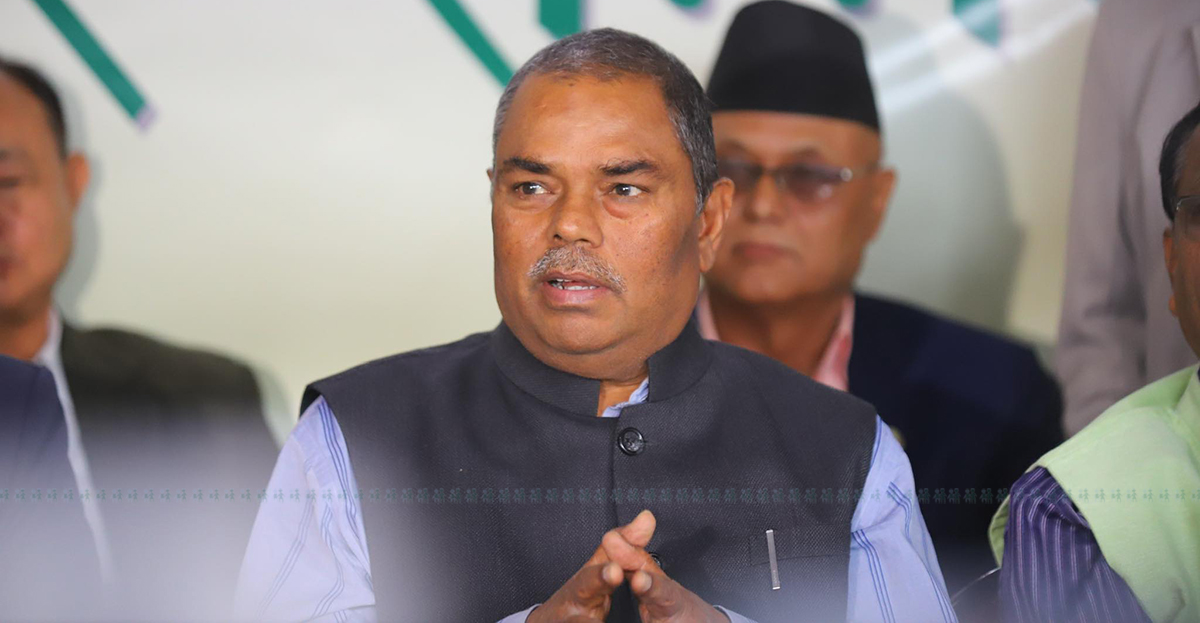The central executive committee meeting of the Janata Samajwadi Party (JSP) Nepal, led by Upendra Yadav, has decided to withdraw its support to the government.
The committee instructed the parliamentary party to withdraw the support given to the government.
“Our party’s executive committee meeting has directed the parliamentary party to reconsider the support given to the government,” JSP Nepal Chairman Upendra Yadav told Setopati. “We made the decision was made based on the government’s performance and evaluation over the past year.”
Yadav said the parliamentary party would hold a meeting and make a decision within a few days.
“The party has expressed dissatisfaction with the government’s performance,” Yadav added. “The government failed to fulfill its commitments, which is why we decided to reconsider.”
Yadav heads both the central executive committee and the parliamentary party of JSP Nepal.
Senior JSP Nepal leader Raj Kishor Yadav said the parliamentary party would soon convene a formal meeting and finalize the decision to withdraw support to the government.
“This government was supported with expectations of Constitutional amendment, good governance, and boost in economic activities,” he said. “The government has completely failed. Therefore, the executive committee has instructed the parliamentary party to withdraw support.”
In the 59-member National Assembly, the ruling coalition parties have only 27 lawmakers – 16 from the Nepali Congress, 10 from the CPN-UML, and 1 from the Loktantrik Samajwadi Party Nepal.
The JSP Nepal, which has been supporting the government without joining it, has 3 lawmakers. With the party's support, the government held a majority with 30 lawmakers in the National Assembly.
However, if the JSP Nepal withdrew its support, the government would fall into a minority in the National Assembly.
The largest party in the National Assembly, CPN (Maoist Center), is in the opposition with 17 lawmakers. The CPN (Unified Socialist) has 8 lawmakers, and the Rastriya Janamorcha has 1, totaling 26 opposition lawmakers.
The National Assembly has three nominated lawmakers. Among them, Narayan Prasad Dahal, the National Assembly chairperson, was nominated under the Maoist Center quota. Anjan Shakya was nominated under the UML quota. Similarly, Bamdev Gautam was also nominated to the National Assembly when the UML and Maoist Center had unified to form the CPN.
Even with the support of Bamdev Gautam and Anjan Shakya, the government would have only 29 lawmakers after JSP Nepal’s withdrawal, falling short of the 30 needed for a majority.
JSP Nepal’s parliamentary party leader in the National Assembly, Mrigendra Kumar Singh Yadav, said they would sit in the opposition bench once the parliamentary party decides to withdraw support to the government.
“The parliamentary party meeting hasn’t taken place as some lawmakers are currently outside,” he said. “Once the party decides to withdraw support, the government will fall into a minority.”
He added that they had rejected the land-related ordinance, but the government brought it as a bill without changes, leaving no room for amendments.
“There’s no prospect of constitutional amendments. The prime minister himself says that it will happen in 2027. From amendments to good governance, nothing has been done,” Yadav said. “We had been supporting the government from outside. Now, since the government hasn’t done anything, why should we remain mere witnesses? That’s why the executive committee instructed us to withdraw support.”

